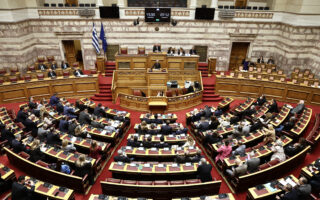‘Greece is out of the woods’
Greece’s finance minister tells Kathimerini the government wants to increase the availability of small and medium-sized apartments in an effort to tackle the lack of housing

Greece’s Finance Minister Kostis Hatzidakis defended the introduction of the minimum presumptive income for freelance professionals and the self-employed based on which they were taxed for the first time this year, telling Kathimerini it is a “fair measure” toward salaried employees and pensioners who traditionally paid more tax.
Data from the Independent Authority for Public Revenue (AADE) this year showed that 400,000 freelancers and self-employed declared an average monthly income of 268 euros, which appears to vindicate the minister’s decision to impose the measure, despite the criticism it received. With the introduction of the minimum presumptive income, the takings of those more than 400,000 freelancers increased fourfold to 12,794 euros, which means that they had to pay an average tax of 2,058 euros from 1,245 euros last year. Hatzidakis says he “cannot conscientiously accept” that a freelancer truly lives on 268 euros a month.
Regarding specific tweaks to taxation, the minister has announced an extension of the 50% reduction in presumptive income for the self-employed taxpayers who live in settlements with a population of up to 500 inhabitants and on islands with a population of fewer than 3,100.
Ahead of the 88th International Trade Fair of Thessaloniki (TIF) in September (7-15 September), how would you rate your financial policy so far? You have been criticized for delays, lack of interest and the still unresolved problems of society.
Greece today is out of the woods, it has made great progress in the last five years, but it has not become Switzerland or Sweden. The effort must continue in earnest, combining fiscal discipline with a pro-investment policy. In the last five years, this mixture has worked and Greece has climbed many steps. This can be seen in the significant reduction in unemployment, in the increase in investment, in exports, in wages. In the last year Greece returned to investment grade, which means that for the loans we took this year alone, we will have a benefit of 800 million euros over a period of 10 years. We passed a tax reform, we promoted measures to fight tax evasion, such as the interconnection of card readers (POS) with cash registers, and 10 privatizations were completed. Our banks have entered a new phase with divestment and the entry of private investors. The country is among the first to absorb resources from the National Strategic Reference Framework (NSRF) and the EU Recovery Fund. We adopted a series of modernization initiatives for the Growthfund, with the aim of turning its subsidiaries into businesses like Public Power Corporation and creating a National Investment Fund. We’ve raised tax revenue without raising taxes and sent the message that we want laws to apply at all levels, whether that’s [fighting] tax evasion or enforcing the law on the beaches. It is in this spirit that we will proceed from here on.
There are concerns that the government is suffering from reform fatigue.
Our direction here at the Ministry of National Economy and Finance, just like the direction of [Prime Minister] Kyriakos Mitsotakis, is toward reforms, with speed and determination. Our political philosophy can be summed up in three words: freedom, creativity, justice. In other words, we encourage economic freedom, we promote creativity, investment, innovation, extroversion. And we seek to practice a policy that benefits those who really need it most. We don’t care about pressure from unions. We put the interests of the many defenseless Greeks above everything else.
The Trade Fair of Thessaloniki is also a platform for governments to announce new measures. What should we expect?
In relation to the TIF, we will seek to combine three things: to update our policy responding to contemporary challenges such as climate change, demographics, housing, to respond to justified requests from society to support those who are really in need, but also not to undermine the country’s economic position and the progress we have achieved so far.
What scope is there for support measures, in view of the new EU Stability Pact that sets a spending limit?
Based on the proposal sent to us by the European Commission, the spending for 2025 may increase by 3 billion euros compared to 2024 and we are trying to increase it somewhat more. We are optimistic that we will succeed, although discussions are still ongoing. But I must note that in 2025 we will definitely have a 1-billion-euro increase in regular spending, mainly on health and education, an additional 1-billion-euro increase for pensions, of which 400 million euros is for legislated increases and 600 million euros is for new pensions, as we have more and more pensioners, as well as about 850-million-euro increase for defense, due to the increase in physical receipts, mainly relating to the Belharra frigates. With these we therefore reach almost 3 billion euros and the effort we are making is to create fiscal space so that additional expenditures can be made.
Regarding housing, will you provide incentives, such as for repairs, to open up closed homes?
We want to incentivize landlords to increase the supply of apartments, especially small and medium-sized apartments, to meet the needs of the social class that feels the most pressure.
So there will be a tax break?
I cannot be more specific at the moment.
Will there be any intervention for short-term rentals?
Short-term rentals are very useful because they increase the available beds and in this way help the country’s tourism and at the same time increase the income of tens of thousands of our fellow citizens. On the other hand, it is certain that in some districts, as is the case abroad, they create some malformations. We are carefully examining the picture in all individual areas and we will intervene in a spirit of justice, without creating an issue in the short-term rental market, but also without ignoring the effects created in several cases, especially in Athens.
In relation to climate change, will there be measures to introduce compulsory insurance?
The issue has been open since last year on the initiative of the prime minister himself, we have already proceeded with the mandatory insurance of some businesses, as is done in other countries, and we are discussing expanding the measure to smaller businesses.
What will the demographic initiatives include?
An attempt will be made, to the extent of the budget’s abilities, to adopt a package of measures which will not only be of an economic nature, but will also include measures to reconcile professional and family life.
Did you feel that you were vindicated with the introduction of the minimum presumptive income for freelance professionals and the self-employed, considering that tax data showed that 400,000 freelancers declared an income of 268 euros per month?
This government has reduced a number of taxes: the ENFIA property tax by 35%, corporate tax from 28% to 22%, dividend tax, taxes on families with children, capital accumulation tax, stock exchange tax, zero tax on the acquisition of government bonds, tax stamp duty, VAT on transport and catering, abolition of tax on parental benefits. However, reducing taxes and supporting entrepreneurship is one thing, and tolerance for tax evasion is quite another. Tax evasion is, after all, a violation of free competition. Taxing the self-employed is just one of the 11 initiatives we have adopted. It is a measure that is fair to salaried employees and pensioners, a soft intervention, as it raises the per capita taxation of freelancers to the level of wage earners. Personally, I cannot conscientiously accept that, as minister of finance, I will stand indifferent to tax declarations based on which a freelancer lives on 268 euros a month. Such a cynical and clientelistic logic does not suit me and it does not suit the government of Kyriakos Mitsotakis. The self-employed could challenge the presumptive income but only a few hundred did, an infinitesimal percentage. I think that says something. Furthermore, we cannot ignore that from the additional taxes we have strengthened education and health. If we abolish this measure, where will we find the money?
Will there be any changes and in what direction?
As the prime minister said, we will proceed with some targeted changes, but that’s all. A key element of these interventions will be the complete abolition of the fee for practicing a profession, which means relieving freelancers of [having to pay] 325 euros per year, while the 50% discount, which applies to those who live in settlements with a population of up to 500 inhabitants, will be extended.
What are the next steps you are planning to fight tax evasion?
We are moving forward with the myDATA platform, in which from the end of the year we will eliminate the 30% discrepancy in the declared costs that existed until now. This will be followed by the pilot launch of the digital shipping slip from the beginning of December and universal electronic invoicing, once we get the relevant permission from the Directorate-General for Taxation and Customs Union of the EU. Our goal is a digital AADE. At the same time, we are moving ahead with the fight against fuel smuggling, although sometimes we are surprised by the decisions of certain courts, which we respect anyway. This battle is bearing fruit. Last year we had 9% additional revenue without raising any taxes, a significant part of which comes from fighting tax evasion. In 2024 the results will be more important, due to the presumptive income and connection of cash registers with card readers (POS). Already in the first half of the year, VAT revenues were up around 10%, with inflation below 3%. This increase is related to economic growth and the POS.
Apart from tax evasion, what are your other priorities?
The second is the creation of a single register of benefits, so that – beyond the intervention that will now be made for the OPECA disability allowances and any interventions for the unemployment benefit – there is a central control of benefits, so that those who really need them receive them. The third is, after the 10 privatizations of the past year, to proceed with the substantive utilization of the state’s real estate, by upgrading the Real Estate Registry, promoting the cooperation between privatization agency TAIPED and the Hellenic Public Properties Company (ETAD), and by creating holding companies, for the group utilization of state properties, because if we choose to utilize them one by one, it will take too long.
Will these holding companies be state-owned?
The state will create them, but then private shareholders will come in to utilize the properties.





